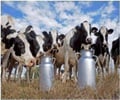Ashwagandha, an herb used in the 5,000-year old practice of Ayurvedic medicine, along with whole cows' milk can help boost immunity, says a group of US researchers.
Ashwagandha, an herb used in the 5,000-year old practice of Ayurvedic medicine, along with whole cows' milk can help boost immunity, says a group of US researchers.
The first-of-its-kind study was led by Heather Zwickey of the National College of Natural Medicine's Helfgott Research Institute, Portland, OR, and her colleagues Jeremy Mikolai, Andrew Erlandsen, Andrew Murison, Will Gregory, Padma Raman-Caplan and Kimberly Brown. Mikolai, Erlandsen and Murison will be presenting the team's findings during the 23rd annual meeting of the American Association of Naturopathic Physicians, which is being held August 13-16, 2008 in Phoenix.According to Zwickey, investigations into herbal remedies rarely take into account how the herb has been administered throughout the tradition of the medicine's life cycle, such as coupled or mixed with water, tea, or oil.
While many consumers today may consume the herb with water or no liquid at all, researchers know that Ashwagandha (Withania somnifera (WS)) has typically been taken with an anupana substance.
Anupana may be derived from many different substances, from olive oil, to beer, to ghee.
To determine if an anupana substance would help enhance Ashwagandha's immune properties, the research team used milk in a co-administered intervention along with the herb extract.
Cows' milk was chosen over goats' milk and other potential substances because Ayurvedic medicine considers it to be a strengthening, nutritive driver for medicines. This made it an appropriate choice for an immunological study.
Advertisement
The research team took blood samples from five healthy volunteers (three female; two male; average age 27) to set a baseline for immune cell levels. They administered an alcohol and water extract of Ashwagandha totaling approximately two teaspoons (6mL) in eight ounces of cows' milk.
Advertisement
lood work was drawn again at 24 and 96 hours post-baseline to look for differences in the cells.
Consuming Ashwagandha with cows' milk had the following effects on the human immune system - there was a statistically significant overall increase in the level of white blood cell activation. Cell activation was most pronounced in the CD56+ Natural Killer cells. This is important, since these cells play a critical role in the body's response to the flu, the mumps or tumors.
Also, there was a statistically significant increase in the number of CD4+ T helper cells. While both CD8+ T helper cells and B cells also increased, the amount was not significant.
Source-ANI
SRM












